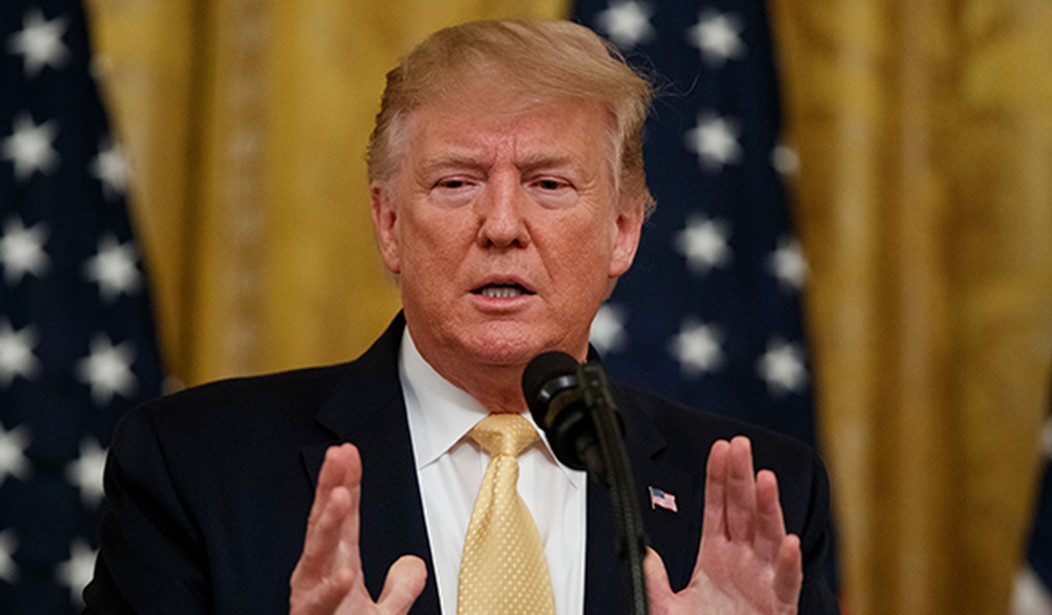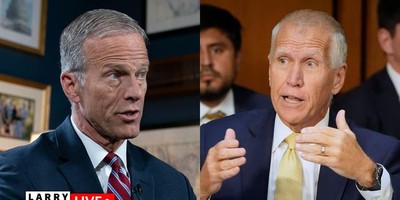Google, Facebook, and Twitter are monopolies whose executives see themselves as the rightful arbiters of public discourse in America. They seemingly ban, “shadowban,” deplatform, and demonetize conservative users and politicians they oppose with alarming regularity. The tech companies, believing that social media played a pivotal role in Donald Trump’s victory, are determined to prevent a repeat of the 2016 election
Americans know the problem — 59 percent of voters see Big Tech bias as a problem, including 68 percent of Republicans and 53 percent of Democrats. Slowly but surely, the American people, their elected officials, and the enforcement agencies of the federal government are rising to address the challenge of online censorship by massive monopolistic entities, which runs directly contrary to the founding principles of our nation.
What’s more, as of this week, this is no longer a partisan issue.
After the first Democratic debate on June 26, the most-searched-for candidate on Google was not Joe Biden or Elizabeth Warren, but Representative Tulsi Gabbard. According to a federal lawsuit Gabbard’s campaign filed Thursday, Google — without warning or explanation — immediately suspended her campaign ads from their service, which controls more than one-third of all internet advertising. Then they started sending the promotional emails from her campaign to the spam folders of Gmail users on the campaign’s email lists.
Gabbard is accusing Google of denying her her “debate bump” at the most critical moment of her campaign. This suggests that Big Tech companies don’t just want to choose which party wins presidential elections; they want to determine which candidates the parties nominate, too. This is a digital version of Tammany Hall, with the 2020 election in the sights of the tech overlords.
Recommended
The Trump administration is starting to fight back in a big way.
Google and Facebook are, at long last, going to face the antitrust scrutiny befitting corporations that control 90 percent and 73 percent of the market share in online search and social media, respectively. The Department of Justice, the Federal Trade Commission, and even the Democrat-controlled House Judiciary Committee have already opened probes based on concerns first raised years ago under the Obama administration.
On Tuesday, however, Big Tech’s antitrust problem got a lot bigger. Makan Delrahim, head of the Justice Department’s Antitrust Division,confirmed there will be a much broader probe, including not just Google and Facebook, but also Amazon and Apple, that could eventually lead to some of the tech giants being broken up.
A review of antitrust activity is inseparable from the free speech problem. As “trust-busting” President Theodore Roosevelt pointed out more than a century ago, one of the greatest problems with monopolies is their “tendency to interfere and dominate in politics.” We are seeing his prophecy play out before our eyes, even as Big Tech executives appeared before Congress and swore it isn’t so.
Ordinary Americans can’t just sit back and wait for regulators to solve the problem themselves. I have the privilege to represent several pioneers in the legal struggle against bias and censorship, including Megan Murphy, the feminist scholar and journalist who was banned from Twitter for daring to question the intentions of a “transgender activist” who is now trying to force Canadian female estheticians to handle and wax male genitalia. I also represent James Damore, the senior Google software engineer who was fired and had his career demolished for writing a memo decrying the company’s ruthlessly-enforced liberal orthodoxy and offering solutions that didn’t fit the social justice norms of Google’s virtue-signalling overseers.
These clients and many other brave Americans continue to be a thorn in the side of tech monopolies that seek to assume complete domination of the contemporary public square. This disturbing reality is one of the reasons why I founded Publius Lex, the first nonprofit dedicated in part to protecting free speech and viewpoint diversity from the iron fist of Big Tech, among other threats including violent extremism and government bias.
New legislation is sorely needed to complement grassroots efforts to combat tech censorship, and for the first time, we’re making real headway. At the Social Media Summit, President Trump opened his remarks by expressing his support for legislation sponsored by U.S. Senator Josh Hawley, a Missouri Republican who has championed online free speech, that would require Big Tech to reflect the norms of political neutrality and the respect for First Amendment principles in their policies in order to continue receiving sweetheart special treatment under Section 230 of the Communications Decency Act. This grants them extraordinary legal protections that have been expanded beyond all recognition by the courts.
The President isn’t alone. Senators Ted Cruz and Lindsey Graham are also getting behind Hawley’s bill, and, in the House, Congressman Paul Gosar announced plans to introduce similar legislation conditioning Big Tech’s Section 230 immunity on respect for free speech.
Polling shows that a strong plurality of voters — 48 percent — support legislative protection against corporate viewpoint bias, while only 21 percent oppose the idea. The results are consistent among Democrats, Republicans, and independent voters alike — an encouraging sign of support for bipartisan solutions to this abridgment of the fundamental rights of all Americans.
The gatekeepers of online information in Silicon Valley are taking notice. It’s not an exaggeration to say that they’re threatened and fighting hard. Big Tech has assembled one of the most formidable — not to mention expensive — lobbyist armies in the history of Washington, D.C. in a desperate effort to squelch these threats to their abuses. They’re also funding a growing constellation of think-tanks and shill front groups to disingenuously appeal to conservatives and libertarians — painting the tech companies as plucky defenders of the free market rather than the abusive monopolies they actually represent.
No amount of lobbying and disinformation can bury the truth — that the Big Tech monopolies are increasingly pushing agendas at odds with the fundamental liberties Americans cherish.
Now that President Trump has championed the cause of internet freedom for all Americans, Big Tech has begun to fight a war of attrition — and our ability to speak and vote freely hangs in the balance.
Harmeet K. Dhillon is a nationally recognized lawyer focusing on commercial litigation, employment law, First Amendment rights, and election law matters. She is the Vice President of the Republican National Lawyers Association.

























Join the conversation as a VIP Member